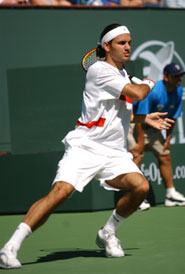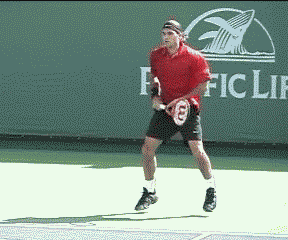|
TennisOne Lessons Motivation Happy Bhalla A key to peak athletic performance from a mental perspective is having the ability to relax while playing and yet remaining alert and intense enough to perform to one’s potential. Most players have the intensity. The desire to win and succeed provides a great motivation and intensity arises from that motivation. Ironically, the very thing that provides us with intensity, the need for success, also makes it difficult for us to relax. The fear of failure creates tension within an individual. Most coaches and players recognize this quagmire, but are unable to find a way out. Helping players to find some semblance of balance seems to be the order of the day. Most successful players have tremendous natural athletic prowess: some may possess the coordination and talent to time the ball perfectly; others may have great speed and agility; still others may have an uncanny quickness in their hands. These physical skills are relatively easy to identify, but similarly some players have mental skills that are also essential for success, which are not so easy to detect. The fundamental mental skill successful players have is the ability to focus intently. For them, the distractions (fame, rankings, money, etc.) are still there, they have not been transcended or eliminated, but despite these distractions, for the most part, they can zone in on the ball, the court and the opponent and execute
In other words, their motivation is as flawed as the next player, but despite that, once the ball is in play, they are able to "zone in" and play freely without the fear that seems to burden so many other players. However, these players are in the minority and even they are susceptible to moments of weakness, when their games break down at critical junctures. Most players do not have this natural ability to "forget" what they are playing for, and so, for them, greater awareness of this situation can precipitate a change in their motivation, which will ultimately allow them to play freely. Through the realization that the desire to succeed is preventing us from succeeding, it becomes easier to drop the desire. But if players do not play with the desire to succeed and all the rewards that winning brings, will they train as hard and work at the game in the same committed manner they do now? Where would be the motivation? Is greed and ambition the best or even the only motivation possible? Is it possible to be motivated by a simple love of the game? Will this love for simply playing motivate players to work as hard as players who are driven by the need to succeed? Is pure love more powerful than greed and the desire for ego-gratification? Love for hitting the ball effortlessly. Love for moving gracefully. Love for problem-solving and competing. Love for being lost in the moment. Love for being total. Love for giving everything one has and holding nothing back. It is hard to say what is possible, but one thing is for sure; right now, for most players, the motivating factor is fame, glory, and money. Love is not the motivator that ego-gratification seems to be. Could this be why almost universally the competitive experience is so ugly at worst and up and down at best?
Can this change? If change is going to happen at the beginning, the initiators will need to be the parents and coaches. The way the game and life is presented has to be more process-oriented. Players will need to become more sensitive to the intrinsic joy of playing and certainly this can be nurtured both on and off the court. Will it still be an uphill battle? Absolutely, but to the extent that one can succeed at doing this, will be the extent of the benefit received by the individual. Ultimately, the players themselves will have to look at their motivation for playing and realize that they themselves are getting in the way of their success. Once this recognition is made and a deeper awareness arises of the situation, things will automatically begin to change. The greatest motivator for change will be the pain they are feeling during competition and if one’s prime motive for playing is for ego-gratification and hunger for success, there has to be pain.
He can be reached at: happybhalla@hotmail.com or www.wholistictennis.com |





 Happy Bhalla has a Masters Degree in Philosophy and Religion and has been teaching tennis for over 30 years.He has written two books and many articles over the past 10 years on the role of the mind in both the learning process and in the competitive experience.
Happy Bhalla has a Masters Degree in Philosophy and Religion and has been teaching tennis for over 30 years.He has written two books and many articles over the past 10 years on the role of the mind in both the learning process and in the competitive experience.